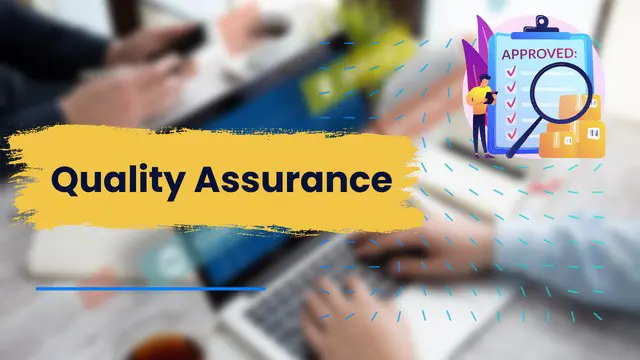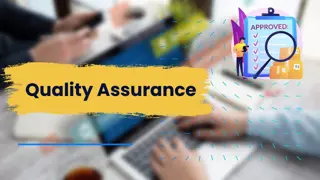
Quality Assurance (QA) & Quality Management Diploma - CPD Certified
CPD Certified| Free PDF Certificate | Lifetime Access | Learner Support | No Hidden Fees | 100% Success Rate
EDURISE
Summary
- Certificate of completion - Free
- Reed courses certificate of completion - Free
- Tutor is available to students
Add to basket or enquire
Overview
Unlocking Excellence: Quality Assurance (QA) Course
In today's fast-paced and competitive business landscape, ensuring the quality and reliability of products and services is paramount. Quality Assurance (QA) professionals play a pivotal role in upholding these standards, making them indispensable assets to organizations across various industries. Are you ready to step into a dynamic world where quality reigns supreme? Welcome to the Quality Assurance (QA) Course – your gateway to becoming a QA expert.
Why Quality Assurance Matters:
In a world where customer satisfaction and brand reputation can make or break a business, the demand for skilled QA professionals is higher than ever before. QA specialists act as the guardians of quality, meticulously inspecting, testing, and refining products and processes to meet stringent standards. Here's why QA is a critical field:
Customer Trust: Businesses that consistently deliver high-quality products and services earn the trust of their customers, fostering loyalty and repeat business.
Cost Reduction: QA practices identify and rectify defects early in the development process, saving organizations substantial costs associated with recalls and rework.
Competitive Edge: Companies with a reputation for quality gain a competitive advantage in the market, attracting more customers and opportunities.
Compliance: In regulated industries such as healthcare and finance, adhering to quality standards and regulations is mandatory to avoid legal consequences.
Continuous Improvement: QA professionals drive a culture of continuous improvement, leading to innovation and enhanced operational efficiency.
What You'll Learn:
Our QA course is designed to equip you with the knowledge and skills needed to excel in this vital role. Without giving away specifics, here's an overview of the areas you'll explore:
Foundations of Quality Assurance: Understand the core principles and philosophies that underpin QA.
Quality Standards and Frameworks: Dive into the world of industry-specific quality standards and frameworks.
Testing Techniques: Master a suite of testing methodologies to detect defects and ensure product reliability.
Quality Documentation: Learn how to create comprehensive documentation that serves as a reference for your QA processes.
Process Improvement: Explore strategies for optimizing processes to enhance quality and efficiency.
Who Should Enroll:
This course is ideal for a wide range of individuals, including:
- Aspiring QA professionals looking to kickstart their careers.
- Industry veterans seeking to stay updated with the latest QA trends.
- Managers who want to foster a culture of quality within their teams.
- Entrepreneurs aiming to embed quality in their startups from the outset.
- Anyone interested in understanding the critical role of QA in business success.
Join the QA Revolution:
Quality Assurance is more than just a job – it's a mindset that drives excellence. Enroll in our QA course to become part of a community dedicated to ensuring quality, reliability, and customer satisfaction. Whether you're looking to sharpen your skills, start a new career, or enhance your business, our QA course will set you on the path to success.
Elevate quality. Elevate your future. Enroll in the Quality Assurance (QA) Course today.
Free Gift
- Course Completion PDF Certificate
- Tutor Support
Curriculum
Course media
Description
Learning Outcomes:
Upon completing this course, students will be able to:
Module 1 – Introduction to Quality Management:
- Understand the fundamental principles of Quality Management.
- Recognize the importance of quality in various industries.
- Differentiate between quality management and quality control.
Module 2 – Total Quality Management (TQM):
- Comprehend the concept and key principles of Total Quality Management (TQM).
- Analyze how TQM can enhance organizational performance.
- Apply TQM principles to improve processes within an organization.
Module 3 – Quality Measurement and Improvement:
- Identify various methods and tools for measuring and assessing quality.
- Implement continuous improvement strategies in organizational processes.
- Evaluate the impact of quality measurement on overall business performance.
Module 4 – Quality Control:
- Define the role of Quality Control in maintaining product or service consistency.
- Apply statistical methods for quality control and process improvement.
- Develop strategies to address and rectify quality issues in real-world scenarios.
Module 5 – Understanding Customer Expectations and Needs:
- Analyze customer expectations and needs in different industries.
- Create a framework for aligning products or services with customer requirements.
- Develop strategies to enhance customer satisfaction and loyalty.
Module 6 – Six Sigma:
- Describe the principles and methodologies of Six Sigma.
- Utilize Six Sigma tools to identify and reduce defects in processes.
- Evaluate the impact of Six Sigma on organizational efficiency and profitability.
Module 7 – Supply Chain Management:
- Understand the role of supply chain management in ensuring product quality.
- Analyze the components of an effective supply chain.
- Identify strategies for optimizing supply chain processes to enhance quality.
Module 8 – Quality Audits:
- Explain the purpose and significance of quality audits.
- Conduct quality audits to assess compliance with quality standards.
- Develop corrective action plans based on audit findings to improve quality.
These learning outcomes will equip students with a solid foundation in Quality Management, Total Quality Management (TQM), quality measurement, and improvement techniques, enabling them to contribute to quality enhancement in various professional settings.
Certificate of Completion
After completing the Quality Assurance (QA) diploma course, you will be able to obtain your free PDF certificate of course completion.
Who is this course for?
The ideal audience for this Quality Assurance (QA) Course includes professionals, managers, and individuals in various industries who seek to enhance their knowledge and skills in quality management and quality assurance practices. Here's a breakdown of the potential audience segments:
Quality Assurance Professionals: This course is suitable for individuals already working in quality assurance roles or aspiring to do so. It will help them gain a deeper understanding of quality management methodologies and tools, such as Total Quality Management (TQM) and Six Sigma.
Managers and Team Leaders: Managers and team leaders responsible for process improvement, quality control, or supply chain management can benefit from this course. It provides insights into optimizing processes and enhancing product or service quality.
Business Owners and Entrepreneurs: Small business owners and entrepreneurs looking to improve the quality of their products or services and gain a competitive edge can find valuable knowledge in this course.
Supply Chain Professionals: Professionals involved in supply chain management will find the Supply Chain Management module particularly relevant. It helps them understand how quality assurance impacts the entire supply chain.
Customer Service and Sales Professionals: Individuals working in customer-facing roles can benefit from Module 5, which focuses on understanding customer expectations and needs. This knowledge can help them improve customer satisfaction and loyalty.
Continuous Improvement Practitioners: Those involved in continuous improvement initiatives within organizations will find the quality measurement and improvement modules valuable for enhancing their problem-solving and process improvement skills.
Manufacturing and Production Personnel: Professionals working in manufacturing and production roles can gain insights into quality control techniques and methodologies to ensure consistent product quality.
Auditors and Compliance Officers: Individuals responsible for conducting quality audits and ensuring adherence to quality standards can enhance their auditing skills through Module 8.
Students and Graduates: Students pursuing degrees in business, management, engineering, or related fields can use this course to supplement their academic knowledge and gain practical insights into quality management.
Career Changers: Those considering a career change into quality assurance or management roles can use this course to acquire fundamental knowledge and terminology related to quality management.
In summary, this course caters to a broad audience interested in improving quality-related practices in their respective fields. Whether you're a seasoned quality professional or just starting your career, the course offers valuable insights into quality management concepts and strategies.
Requirements
The Quality Assurance(QA) course has no formal entry requirements.
Career path
- QA Tester: Entry-level position with a typical UK salary ranging from £20,000 to £30,000 per year.
- Senior QA Analyst or Quality Assurance Manager: With experience and certifications, salary can advance to between £31,000 and £60,000 annually.
- QA Director or Quality Assurance Lead: Experienced professionals in these roles may earn £61,000 to £100,000.
Questions and answers
Currently there are no Q&As for this course. Be the first to ask a question.
Certificates
Certificate of completion
Digital certificate - Included
Reed courses certificate of completion
Digital certificate - Included
Will be downloadable when all lectures have been completed
Reviews
Legal information
This course is advertised on reed.co.uk by the Course Provider, whose terms and conditions apply. Purchases are made directly from the Course Provider, and as such, content and materials are supplied by the Course Provider directly. Reed is acting as agent and not reseller in relation to this course. Reed's only responsibility is to facilitate your payment for the course. It is your responsibility to review and agree to the Course Provider's terms and conditions and satisfy yourself as to the suitability of the course you intend to purchase. Reed will not have any responsibility for the content of the course and/or associated materials.


